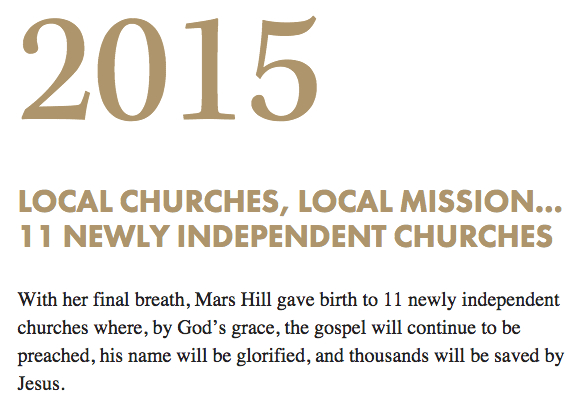This past week yet another scandalous story broke having to do with the ministry of Mark Driscoll and Mars Hill Church in Seattle.
This story is, frankly, somewhat derivative – last month a similar one surfaced about megachurch pastor Steven Furtick. And, it follows on Driscoll’s last moment in the media rotation over questions of plagiarism. But this one could be a hell of a lot more serious than those previous blips on the evangelical media radar.
Essentially, Driscoll/Mars Hill hired a marketing company to engineer massive sales of his book Real Marriage all at one time, landing him on the New York Times bestseller list for exactly one week (Exhibit A: the actual contract with the marketing firm). Now he can market himself as a “New York Times bestselling author.” It cost him over $200,000. And it made use of his church’s nonprofit status to pay for the books. In addition to being a clear case of gaming the bestseller system (which is, in itself, dishonest and unethical), this might be a breach of nonprofit law resulting in the loss of Mars Hill’s 501(c)3 status.
The Christian Internet is obviously abuzz with condemnation of Driscoll’s actions here, as it should be. But I think all of the commentary may be missing the point somewhat. Namely, this latest story, while important, isn’t the disease. It’s just another symptom.
I’ve been following Driscoll closely for the last eight years, beginning as something of a fan (back when he and Rob Bell were somehow kinda similar relevant, emerging mega-pastors) and becoming increasingly alarmed by his both his theology and pastoral practices. But one thing has been very clear to me from the first time I came across a Driscoll church-planting bootcamp talk: When it comes to Mark Driscoll’s approach to ministry, it’s all business. [Tweet This]
Driscoll even has a famous theological formula for explaining this. He talks about leaders in the church as being either “prophets, priests, or kings.” Prophets are preachers and priests are soft-hearted pastoral types. But kings, he reasons, are those who are particularly gifted in the areas of administration and business to grow and expand the church and make use of every means to “reach” (read: assimilate) as many people as possible. Very early on in Mars Hill’s story, Driscoll used to boast about having a former Google executive on his ministry team – this put them on the cutting edge of media ministry, etc. And Mark gleefully describes one of his current executive elders (of 3) by saying, “he runs a very large company, a Harvard business guy.” And it’s very clear from the hiring, firing, church discipline, and non-disclosure methods of Mars Hill that business is the unapologetic M.O. for achieving their goals. Again, aiming to grow as large as possible seemingly by any means necessary.
Now, I understand that any organized church has to function in some capacity as a business, managing people, programs, property, and finances. However, if the primary identity of the church is ministry, then business becomes a secondary consideration, a necessity to support the work of actually serving people and meeting real needs. Further, if ministry is primary, then the secondary business practices must be held to the highest ethical standards, with plenty of accountability and swift correction if anything unethical or corrupt takes place. In this way, when it comes to business, churches ought to function like the humblest and most honorable nonprofit corporations, highly accountable and as lean as possible in order to put ministry and service first.
But that’s not the primary identity of Mars Hill Church. Mars Hill’s primary identity is that of a mega-corporation, increasing its revenues and expanding its brand to cover more and more territory and assimilate more and more people. And its marketing practices reflect this “growth by any means necessary” guideline, even to the point of employing illicit gaming techniques to give the appearance of prestige and popularity to, again, boost the influence of the MHC corporate brand.
It’s all business.
And this should be a lesson to us, and the rest of the church, that if our fundamental identity is business, if we think we ought to operate with corporate “kings” who seek to expand our brand by any means necessary, then we are directly departing from the way of Jesus who calls us to the work of service with integrity and humility. That’s why Jesus took a whip to those who were, quite literally, trying to game the Temple system for profit, at the expense of the faithful. That’s also why Jesus lashed out at arrogant religious leaders of his day who used people for their own power and prestige and engaged in all manner of greedy, dishonest practices:
Then Jesus said to the crowds and to his disciples: “The teachers of the law and the Pharisees sit in Moses’ seat. So you must be careful to do everything they tell you. But do not do what they do, for they do not practice what they preach. They tie up heavy, cumbersome loads and put them on other people’s shoulders, but they themselves are not willing to lift a finger to move them.
“Everything they do is done for people to see: They make their phylacteries wide and the tassels on their garments long; they love the place of honor at banquets and the most important seats in the synagogues; they love to be greeted with respect in the marketplaces and to be called ‘Rabbi’ by others.
“But you are not to be called ‘Rabbi,’ for you have one Teacher, and you are all brothers. And do not call anyone on earth ‘father,’ for you have one Father, and he is in heaven. Nor are you to be called instructors, for you have one Instructor, the Messiah. The greatest among you will be your servant. For those who exalt themselves will be humbled, and those who humble themselves will be exalted.
It might not be popular to say this, but I’m beginning to believe that when this disease is present, there is a drastic disqualification.
This self-exaltation at any cost is not recognized as legitimate by the Messiah.
Simply put: if it’s all business, then it’s not church.












